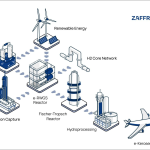Air India has signed a memorandum of understanding with Indian Oil Corporation (IndianOil) for the supply of sustainable aviation fuel as part of efforts to meet the nation’s target of 5% SAF blending by 2030 and a broader aim of achieving the industry’s net zero by 2050 emissions goal. IndianOil has recently become the first Indian company to receive ISCC CORSIA certification for SAF production at its Panipat Refinery. The certification, granted under ICAO’s CORSIA scheme, establishes IndianOil’s capability to produce SAF that meets stringent international sustainability and lifecycle carbon emission standards. Details of SAF quantities are yet to be disclosed but both parties say they will collaborate on the supply of SAF to meet CORSIA targets for international flights and that they intend to reinforce India’s aim to be a front-runner in sustainable aviation.
Air India and IndianOil said they shared a pledge to promote the adoption of low-carbon fuels in aviation, support global decarbonisation goals and contribute to the transition towards more sustainable air transport operations.
“Through this MoU, Air India is committed to support the Indian government’s initiatives to promote sustainable development in the aviation sector and to further its own sustainability goals to achieve the IATA Net Zero by 2050 target,” said the carrier’s CEO, Campbell Wilson.
IndianOil, the country’s largest refiner and third-largest in South-East Asia, announced plans in July to shut the diesel desulphuriser unit at the Panipat Refinery and repurpose it to produce SAF in 2026. The upgraded unit is expected to produce 30,000 tonnes of SAF from used cooking oil. The company said it was also looking to upgrade some kerosene-producing units at other refineries to make SAF.
Commenting on the MoU with Air India, IndianOil Chairman AS Sahney said: “This represents a strategic step in India’s transition to sustainable aviation. With our ISCC CORSIA-certified SAF from Panipat, IndianOil is ready to provide a sustainable fuel solution that will help decarbonise air travel.
“Partnering with India’s flagship carrier, we are aligning national growth with global climate goals and setting a benchmark for the industry.”
In September 2022, Air India and the other airlines in the parent Tata group entered into an MoU with India’s Council of Scientific and Industrial Research and the Indian Institute of Petroleum to collaborate on the research, development and deployment of SAF. The focus of the MoU was to explore Single Reactor HEFA Technology for Drop-in liquid Sustainable Aviation and Automotive Fuel (DILSAAF).
In addition to the use of SAF, Air India reports other green initiatives, such as adopting flight planning and optimisation systems, which includes upgrading its route planning software and coordination with air traffic management. It is also reducing single-use plastics and using lighter materials for cutlery and dishes, as well as optimising processes such as more frequent engine and airframe washes, implementing single-engine taxiing and autonomous-EV towing to save jet fuel.
With 570 new aircraft on order, Air India says its fleet renewal plan will enable it to operate what it claims will be one of the lowest carbon emitting fleets in the world, with plans to establish more non-stop city-pairs resulting in less emissive flights and itineraries.

Top photo: Air India Airbus A320neo
Bottom photo: IndianOil’s Panipat Refinery, India’s largest

Christopher Surgenor
Editor














More News & Features
UK SAF projects progress as Heathrow increases SAF incentive for airlines
Montana Renewables and World Energy join to scale up North American SAF deliveries
Regional SAF News February 2026
SkyNRG reaches financial close for Dutch 100,000-tonne SAF facility
Concrete Chemicals consortium secures €350m public funding for German eSAF project
SAF One announces new investment and technology partners for Middle East SAF project